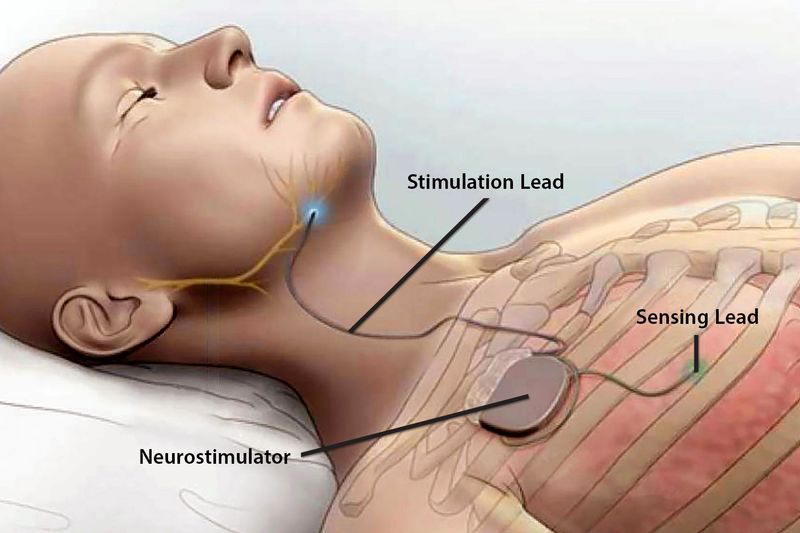During sleep sometimes it seems like your breathing has stopped and you are feeling extreme discomfort. You awaken feeling in need of breath and gasping for gulp of air. this means that you simply may need apnea .
Unlike other sleep disorders which are easier to diagnose, central apnea are often very confusing. People affected by CSA might not have a history of sleep disorders previously. they’ll have a perfect weight and their health can also seems fine, but they still find themselves with this condition characterized by obstruction of breathing several times during night.
It may be a neurological condition. during this condition brain is unable to send correct signals to the systema respiratorium while sleeping. Sometimes other medical conditions also can cause CSA, sometime other medications also can cause it and CSA can occur for no reason sometimes.
Central apnea is different from obstructive apnea because the explanation for blocking isn’t physical, it’s thanks to brain isn’t ready to send correct signals. In simpler terms, there’s a miscommunication between and your systema respiratorium .
Symptoms of Sleep Apnea
Central apnea like other apneas involve disruption of sleep through the night thanks to pauses in breathing pattern. The symptoms include:
Abrupt Awakening during night
Chronic snoring
Insomnia
Drowsiness in daytime
Fatigue
Headaches in morning
Mood irritability
Waking up feeling all tired and not rested
Sensation of soreness and dryness of throat
Chest pain while sleeping
Difficulty in concentrating
Mood swings
Some unique symptoms of central apnea that are different from other are
Change in accent
Difficulty in swallowing
Numbing sensation in your body
If you’re affected by such symptoms, we recommend that you simply simply should consult best neurophysician about the likelihood that you may need central apnea . If this condition is consistent, you’ll be asked to require a sleep test which will help the doctor to work out the precise condition.
Cause Of Sleep Apnea
This condition occurs when brain fails to speak the right signals to breathing muscles. The causes vary and depends upon the sort of central apnea you’ve got .
Drug induced occurs thanks to certain medications like opioids and cause breathing to become irregular and or sometimes stop it completely.
High-altitude Cheyne-Stokes respiration apnea occurs once you are at high altitude. The change in oxygen levels causes increase and reduce in breathing.
Medical condition induced apnea occurs thanks to some medical conditions like end stage kidney diseases and stroke and it’s going to also produce to CSA of non-Chyene-Stokes Variety.
Idiopathic Central Apnea which isn’t associated to any disease.
Risk Factors
Certain factors can increase the danger of central apnea
Sex
Male are more likely to suffer from central apnea .
Age
People with older ages are more likely to suffer from apnea because when age progresses, people tend to urge other medical conditions too.
Heart Disorders
People affected by heart disorders are at greater risk of central apnea .
Stroke or brain conditions
Brain condition also impair the brain’s ability to manage breathing patterns.
Drug Use
Drug use also makes one susceptible to get central apnea .
Complications
Central apnea may be a serious medical condition and it can cause further complications. Consult best neurophysician once you
Fatigue
The disturbance in sleep pattern and repeated awakening makes it difficult for an individual to sleep normally. People with CSA experience extreme fatigue, they feel extremely frowsy during daytime and irritability.
People find it difficult to concentrate and focus. Hypersomnia is common in people with central apnea .
Cardiovascular problems
During central apnea blood oxygen level drops down which further aggravates the decline in heart health.
Diagnosis Sleep APnea
Central apnea is diagnosed by employing a test polysomnography which is usually called as sleep study. In this, you’re connected to an equipment that monitors breathing pattern, neural activity and oxygen levels and movements of your arm and legs.
Treatment Sleep APnea
Treatment of central sleep includes treating CSA or attempting to treat the underlying causes to eliminate CSA.
Reducing opioid use can also eliminate CSA.
Using CPAP may be a first line treatment for CSA which involves wearing a mask over your nose while sleeping. The mask is attached to a hose and alittle pump which maintain the pressure in order that airways remain open.
Adaptive servo-ventilation regulates amount of pressure with every breath rather than providing continuous pressure as just in case of CPAP. this is often used when CPAP is ineffective.
Using supplemented oxygen during sleep also help in eliminating CSA. Various devices are available to deliver oxygen to lungs.
Certain medications also help in eliminating CSA.
Consult with best neurophysician to debate which treatments options suits best to you.
NextHealth offers delivery in Lahore, Karachi, Islamabad, Peshawar and also across other cities in minimum time.
